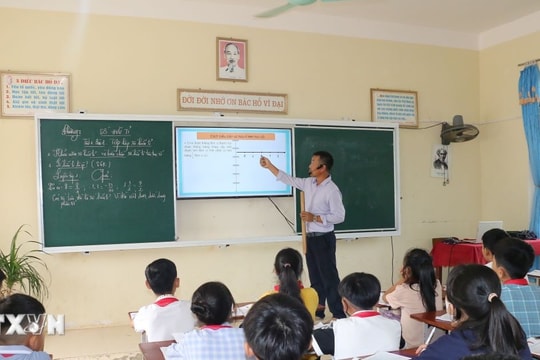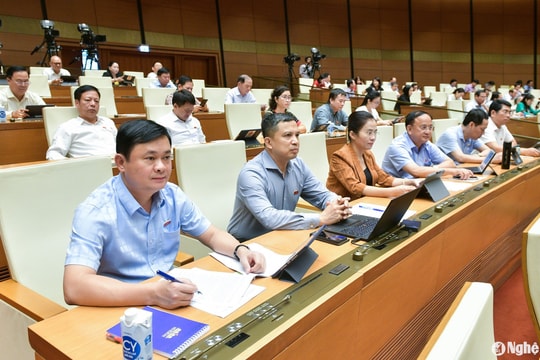Dr. Nguyen Si Dung: 'If you want to get rich, don't be a civil servant!'
(Baonghean.vn) - Recently, there has been a trend of some civil servants resigning from state agencies to "work outside". Nghe An Newspaper had an interview with Dr. Nguyen Si Dung - Former Deputy Head of the National Assembly Office about some related issues.
Pv:In some localities, the number of civil servants moving to work in the private economic sector is increasing. What is your view on this trend, is it worrying?
Dr. Nguyen Si Dung:The fact that civil servants resign to work outside their jobs is happening in many places, especially in the southern regions. I think it is a healthy trend!
 |
| Dr. Nguyen Si Dung talks with Nghe An Newspaper reporters. Photo: Duc Anh |
If civil servants find jobs in the market, it proves that the market economy is creating demand for jobs, and thus the market economy is operating in the right direction because it is opening up more opportunities for labor and income for society. This is very different from the subsidy period.
Now there are many opportunities to get rich in the market, in the private sector, this shows that choosing and promoting the development of the market economy is the right choice. And the trend of civil servants leaving their jobs in state agencies to work in the private economic sector is not a cause for concern but should be supported.
In the world, the general trend is that if you want to be rich, you work in the private sector, and if you want to contribute, you work in the public sector. If you want to get rich in the public sector, or rely on the public sector to get rich, then there is only one way: corruption. Corruption is the factor that destroys national governance, loses public trust, and in the long term will cause instability.
Therefore, it is necessary to clearly define that if you want to contribute, go to the public sector, and if you want to get rich, go to the private sector.
Pv:Can you propose solutions to improve the quality of civil servants, so that civil servants can work with peace of mind?
Dr. Nguyen Si Dung:People who leave the public sector to work in the private sector are clearly doing one thing: freeing up space for others. They are also making it easier for public sector employers to recruit people who want to contribute.
I believe that there are two types of people who want to contribute: those who want to contribute without the ability and those who want to contribute with the ability. Therefore, the task of recruitment is to select those who want to contribute and have the ability.
 |
| Dr. Nguyen Si Dung follows information on Nghe An Newspaper. Photo: Duc Anh |
I see that in other countries, there are always psychologists in the selection process. They see if that person is truly motivated to contribute or not. With just a few questions, people can assess and evaluate whether or not a person wants to contribute. If they know that you are entering the public sector to gain fame, or worse, to get rich, they will immediately eliminate you.
So the trend of people quitting their jobs is creating an opportunity for us to choose people who are both motivated and capable. The remaining issue is how the process works.
To do so, the recruitment process cannot be based on familiarity and lobbying. If recruitment is based on familiarity and lobbying, a series of employees will be recruited and then cannot be fired.
To make civil servants and public employees feel secure in their work, the first important solution is to continue to reform salaries effectively. We must ensure that civil servants can live a decent life. They have joined to contribute, so we must ensure their income so that they can contribute with peace of mind.
Therefore, the salary reform roadmap must bring back a decent life for civil servants and public employees. A civil servant who looks at his neighbor eating a meal and still feels hungry, will most likely find it difficult not to violate the law.
So I think we have implemented salary reform but the current salary level is still not enough to ensure a decent life. Therefore, we need to continue to reform more strongly.
The second solution is to reform the system. We must reform the system to reduce the burden on the budget. Only when only civil servants receive salaries from the budget can we ensure a decent salary for civil servants. As for the budget, which is burdened with spending on non-civil servants, it faces the problem of not having enough money to spend.
Other organizations must have income from other sources. Social organizations will operate better if they receive salaries from the income of their members. If they receive salaries from the state budget, social organizations will also work like a state agency. And if they receive salaries from the state, the motivation to invest will be for the state. And to invest for the state, why do we need you? Because you should represent society, represent the public.
Any association's organization must represent the values of its members. It must bring the voices and demands of its members to the government, and the legitimate demands of its members must be institutionalized. Then, the members will pay membership fees commensurate with the benefits that the association's officials bring. If you do a lot, people will pay a lot, if you do a little, they will receive a little, and if you do not represent them, why should they pay you?
Thus, salary reform must go hand in hand with reform of the operating system.
Pv:From the process of researching and learning about the practical models with many advantages applied in the world, what do you have to share about the experiences and good practices of other countries?
Dr. Nguyen Si Dung:I think many places in the world have defined quite clearly what society does and what the State does; what is provided through public services and what is provided through the market. What businesses can do and what society can do, the State should not take over. If you take over too much, where will the money come from to pay?
In many countries, they let the private sector do many things. For example, in many countries, the prison system is run by the private sector, and the government only pays for it. In reality, the private sector does as well as the government. So why does the government have to organize a complex apparatus to do it for them?
Or business administration, if privately managed, they will manage more simply, the way they recruit people to work for them is also more practical. They just give targets, goals that you have to operate, work to produce high interest rates. But if you only produce interest rates below average, they will replace you. Therefore, they have a clear responsibility system.
Along with that, some things that the people cannot do, the State will do. For example, security and order, law and order, ensuring justice, the State must do. Or there are public benefits, called public goods and public services, such as public lighting, which are assigned to the State. If this can be done, the payroll will be streamlined, the budget-based salary apparatus will be streamlined, and the salary reform will be truly fundamentally successful. Basically, the problem of low civil servant salaries, not enough to live on, will be solved.
Pv:Thank you very much!
Ngo Kien
(Perform)



.jpg)




